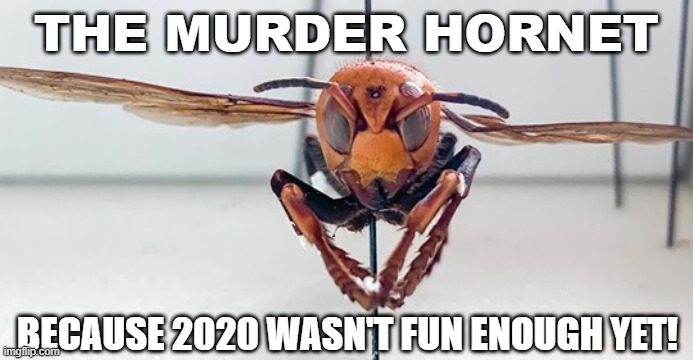Murder hornets: What’s the buzz?
Photo imgflip.com
First, it was the possibility of World War III. Then, Australia’s forests went up in flames. A few months later, Covid-19 entered the picture. And just as 2020 looked like it couldn’t get worse, articles about murder hornets flew into our feeds.
Nicknamed “murder hornets,” Asian giant hornets are responsible for the death of around 50 Japanese citizens annually. According to nytimes.com, the insect can massacre a honeybee hive in a few hours to collect food for its offspring, or will puncture larger prey with its lengthy venom-releasing stinger.
There have only been two sightings of murder hornets in the United States, both during the fall of 2019 in Washington state. However, there were multiple sightings along the Canadian border, most notably on Vancouver Island, where a beekeeper attempting to exterminate an infested hive was repeatedly stung through his bee suit, according to a nytimes.com article.
The victims have likened being stung by a murder hornet to having scorching metal pressed against his flesh, but the real trouble comes from being attacked by a colony, as the repeated venom injections can result in death.
Those who provoke murder hornets are at the greatest risk, but even so, the hornets are more likely to attack their usual prey. While honeybees will only sting to protect their hives or aggressors, these hornets strike when they sense any form of danger.
As of now, it doesn’t seem like murder hornets are a serious threat to the American people or the ecosystem. However, if the species continues to reproduce in the states, the nation’s bee population will be exterminated.
WHS Science Teacher Molly Dennis said, “[Honey Bees] are absolutely vital to plant pollination – including pollination of crop plants. We need to be saving and increasing the honeybee population, not allowing an invasive species to decimate it.”
Until research indicates a domestic infestation of murder hornets, there’s no reason to panic. Recent publications suggest the issue is being blown out of proportion, a consequence of widespread concern for the fate of the nation in general.
“The pandemic and murder hornets are dangerous, but with proper precaution, the problems will be resolved and all the hysteria around [them] will dissipate,” sophomore Grace Klag speculated.
While murder hornets are not an impending threat, there’s a more familiar insect that is much more dangerous to human health: the mosquito. According to the WHO, 700,000 people around the world die from mosquito-borne illnesses annually.
Lawrence Reeves, assistant research scientist at University of Florida’s Medical Laboratory, said to cnn.com that he’s surprised by the attention murder hornets have received, since there are discoveries of new invasive mosquito species each year. The likelihood of extracting a disease from a mosquito in the United States is also relatively low, but they have brought West Nile, eastern equine encephalitis, and dog heartworm to the states in recent years.
Since 2020 is already viewed as a “meme year,” people are going to have to make educated decisions about how seriously they receive the news and memes about the species. Murder hornets and mosquitos alike aren’t the nation’s biggest concerns in the midst of the pandemic, but it’s important citizens have them on their radars.

